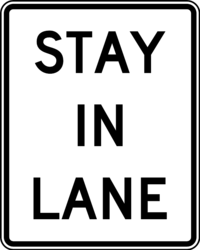
You're in an area where changing lanes is prohibited. If you're not told otherwise, stay put.
This sign informs that a low point in the road is approaching. Slow down for your own sake and to keep control. Proceed with caution, and be prepared to stop if the dip becomes flooded.
This is correct; the sign says, "Turn left or straight."
Workers are in or near the roadway, as indicated by this notice.
This sign denotes a railroad crossing with a short ground clearance. A vehicle with a long wheelbase or limited ground clearance may become stuck on the rails due to the elevated railroad crossing. A car driver should not encounter this type of railroad crossing unless he or she is towing a trailer or driving a mobile home with limited ground clearance.
Work Zone Signs are typically designed like warning signs but are black and orange in color. These signs are only used in places where there is maintenance, construction, or utility work. They're positioned on or near the road. When you encounter these signals, stay aware and slow down.
A flagger sign, such as this one, denotes the presence of a flagger stationed nearby to maintain traffic control. Prepare to slow down and listen to the flagger's instructions.
Advertisement
The second option is the correct answer.
Slow down and grant right-of-way to vehicles crossing your route. If the path is clear, proceed gently and without stopping. Yield signs are typically placed when auxiliary roads intersect with major highways.
When driving on wet roads, reduce your speed.
Work Zone Signs are typically designed like warning signs but are black and orange in color. These signs are only placed near maintenance, construction, or utility areas to alert motorists that employees and road equipment may be present on or near the highway. They're positioned on or near the road. When you encounter these signals, stay aware and slow down.
This sign warns you that there is a bus stop ahead, so proceed with caution.
Any pedestrian crossing any street should be given the right-of-way.
This warning cautions that in wet weather, the road you're on is likely to become slick.
Advertisement
Accommodation available' is stated on the road sign.
Commercial trucks must stay at or below the posted speed limit, while passenger cars can continue at the posted speed limit.